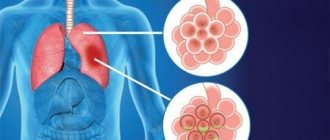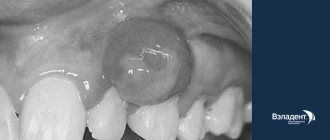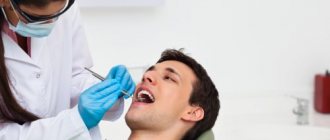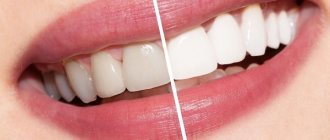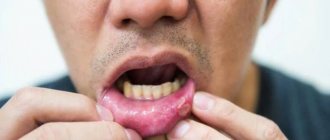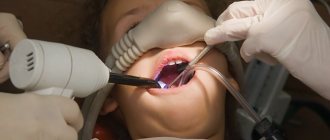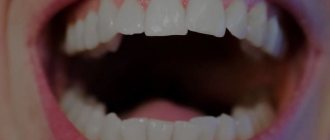Author of the article:
Soldatova Lyudmila Nikolaevna
Candidate of Medical Sciences, Professor of the Department of Clinical Dentistry of the St. Petersburg Medical and Social Institute, Chief Physician of the Alfa-Dent Dental Clinic, St. Petersburg
Today everyone knows the importance of healthy intestinal microflora, however, not every one of us thinks about the impact of oral microflora on the health of teeth, gums and the entire body as a whole. Let's talk about how, if necessary, probiotics can help restore the microflora of the oral cavity.
Microflora of the oral cavity
The human oral cavity is a unique ecological system. The permanent microflora in the mouth is formed by hundreds of different organisms; a moist, relatively warm environment creates favorable conditions for their reproduction.
The following play a significant role in the composition of the normal microflora of the oral cavity:
- veillonella, which neutralize acidic foods;
- bacteria of the genera Propionibacterium, Corynebacterium and Eubacterium, producing molecular oxygen;
- lactobacilli;
- rod-shaped lactobacilli - producers of lactic acid;
- bifidobacteria, necessary for the fermentation of carbohydrates and the production of B vitamins and others.
It is difficult to overestimate the importance of healthy oral microflora for the body. It is in this environment that the primary process of food digestion occurs, and therefore the absorption of vitamins and nutrients. Normal microflora is necessary for the proper functioning of the immune system and protecting the body from various fungal, bacterial and viral infections.
With the uncontrolled proliferation of opportunistic microflora and an imbalance of bacteria in the oral mucosa, oral dysbiosis occurs, an extremely unpleasant disease that provokes damage to tooth enamel and gums and can lead to extremely serious consequences for the entire body.
Reasons for the appearance of this scent
To decide how to quickly remove the smell of alcohol from your mouth, you need to understand the root causes of its occurrence. The reason for these consequences is the consumption of alcohol, with subsequent products of its breakdown. Stomach juice acts as an acid and is activated when various nutrients enter the body. Alcoholic drinks, such as vodka or any type of beer, regardless of what type it is: dark or light, during processing, not useful compounds are released, but a large number of toxins. Activation of this process occurs no more than an hour after even a small dose of alcohol enters this vital organ. The liver will also help with this, processing alcohol-containing substances into harmless acid, which leaves the body gradually.
Before the ethyl alcohol contained in any alcohol-containing drinks is processed by enzymes, the aroma is separated from the liquid, mixed with carbon dioxide produced by the lungs, and released. Scientists have proven that this compound is excreted not only through the mouth, but also through the pores on the skin. And it would be correct not only to eat parsley stems, but when morning comes, you can take a shower. Hot water flushes away deep deposits of waste products from the body and also relieves some of the symptoms caused by a hangover. Doing light sports exercises before water procedures will be beneficial.
How do you know when it’s time to restore the microflora?
Untimely treatment of dysbiosis can lead to tooth loss. Therefore, at the slightest sign of disease, it is important to consult a dentist as soon as possible. Based on an examination of the oral cavity and test results, the doctor will prescribe effective treatment for the pathology and, if necessary, recommend probiotics and lactobacilli for the oral cavity.
Dentists divide dysbiosis into several stages:
- Dysbiotic shift is a mild increase in the number of one of the types of opportunistic microorganisms. The general composition of the microflora does not change.
- Subcompensated dysbacteriosis. The number of beneficial microorganisms decreases slightly against the background of increased activity of opportunistic bacteria.
- Monoculture, in which beneficial microorganisms are replaced by a pathogenic monoculture, and lactobacilli in the oral cavity are absent or remain in the form of traces.
- Decompensated, in which the microflora is populated by associations of pathogenic bacteria, as well as yeast-like fungi.
At the initial stage, dysbiosis manifests itself in the form of sticking in the corners of the mouth and an unpleasant odor. At later stages of development, the disease manifests itself with symptoms such as:
- dry mouth;
- coating on the tongue;
- tartar;
- unpleasant taste in the mouth;
- point inflammation on the gums;
- bad breath;
- plaque;
- compaction and blisters on the mucous membrane;
- regular inflammation of the tonsils.
Traditional medicine advice comes to the rescue
Sometimes traditional medicine helps to cope with halitosis, but a disclaimer is needed here: all these recipes will only help to mask the symptom, but if it has a pathological basis, you cannot do without medical help. Here are the most popular and effective folk recipes against halitosis:
- Pour a little thyme (a tablespoon) into a liter of plain water and leave for a couple of hours. After some time, the product can be filtered and used twice a day for rinsing,
Thyme is good for rinsing - Pour a spoonful of St. John's wort into 250 ml of freshly boiled water and simmer over low heat for just a minute. After this, strain and use for rinsing after each meal,
- Pour a small amount of mint (a teaspoon) into a glass of boiling water and leave for an hour. Then strain and use as directed up to 5 times a day,
- Pour boiling water over a spoonful of fresh strawberries and leave for a couple of hours. After this, strain and use the water for rinsing,
- Dissolve lemon juice in warm water and use as needed.
Before using any of the remedies described above, you should definitely consult your doctor. If your breath quickly becomes stale after standard teeth brushing, there may be a more serious cause than smoking, poor hygiene, or a love of garlic. This is a full-fledged symptom that requires professional diagnosis and treatment.
Oral probiotics (oral probiotics)
Probiotics are live microorganisms that promote the growth of friendly microbiota. Most often, such substances are used to improve intestinal microflora, but not many people know that there are probiotics for the oral cavity.
It is important to understand that probiotics for the oral cavity are represented by one group of substances, and probiotics for the intestines are a completely different one. Scientific research regarding these drugs is very controversial, so dentists recommend using them only as an addition to the prescribed treatment for dysbiosis.
Self-diagnosis methods
A person is not always aware of his problem, because even the closest person may be embarrassed and not tell you that your breath smells bad. Want to test yourself for smell? There are three reliable ways:
- Arm yourself with a metal dessert spoon. Rinse it under running water and wipe dry thoroughly. Lick the back of the spoon, wait about 5 seconds. If you smell an object, you can understand what smell is coming from your mouth.
- Another similar method is to lick your hand and hold it in the air for 5 seconds. What you feel is the same thing your interlocutors experience while talking to you. Please note that this test greatly reduces the intensity of the odor. If you feel something unpleasant, it’s time to start treating halitosis.
- Place both palms tightly against your lips and exhale sharply, then inhale instantly.
If you are not satisfied with the smell, start with a diagnosis and identify the cause, then begin treatment.
How do probiotics work?
Dysbacteriosis and inflammatory processes in the oral cavity very often cause not only local discomfort, but also discomfort in the gastrointestinal tract and bad breath. Antibiotics, along with pathogenic microorganisms, begin to destroy the beneficial bacteria necessary for humans.
Probiotics are live strains of “friendly” bacteria and bring invaluable benefits to the body:
- help destroy pathogenic microorganisms;
- promote the regeneration of damaged tissues;
- activate the immune system;
- normalize cell metabolism;
- prevent cells from degenerating into malignant formations;
- restore the balance of fluid and beneficial microorganisms;
- prevent allergies;
- removes unpleasant odors from the mouth;
- eliminate toxins produced by pathogenic microorganisms.
Review of popular and effective remedies for unpleasant odors
There are several proven effective drugs that, according to reviews, help better than others in the fight against halitosis. Below is a rating of the top most effective products, the correct use of which helps not only get rid of an unpleasant odor, but also eliminate the cause of its appearance.
"Septogal" - lozenges
The review opens with a combination drug in tablet form - Septogal. The active components of the product have a direct effect on most types of bacteria and viruses. Essentially, it is a medicine that is sometimes prescribed as part of the treatment of infectious diseases, in particular to combat halitosis as a symptom of a pathological process in the oral cavity.
Septogal tablets will help fight unpleasant odors
The composition contains sucrose, so the drug is not prescribed to patients with diabetes. The tablets are intended to be dissolved every 2-3 hours during the day. After taking it, you should not eat or drink milk for an hour. The drug is contraindicated if you are allergic to menthol, mint or eucalyptus.
Spray or solution "Miramistin" with antibacterial effect
An antiseptic solution, tasteless and odorless, forms a persistent foam when the bottle is shaken. The active components included in the composition act on pathogenic microflora from the inside, effectively destroying yeast-like fungi, viruses, and infectious agents. The drug can be safely used during pregnancy, which only confirms the absolute safety of its composition.
In some cases, Miramistin is prescribed
Halitox drops to combat the cause of the problem
The drops do not mask the odor, but act directly on the cause of its appearance. The use of the drug helps to gently cleanse the body of decay products and helps in the fight against parasites. It contains only natural substances, including mountain propolis extract for a bactericidal effect and effective removal of toxins. Black walnut fights parasites and harmful microorganisms, and eucalyptus helps normalize the condition of the respiratory system. Just add 5 drops to a glass of water and take the product before bed.
Halitox drops also help well with the problem
Spray "Lakalut" for antiseptic treatment
Provides complete prevention of caries and effectively disinfects tissues in the oral cavity. Helps remove plaque from teeth and kills pathogenic microflora, mainly due to the presence of chlorhexidine in the composition. There is also peppermint oil here - an excellent help in the fight against halitosis. However, the drug should not be used by children and women during pregnancy, since it contains alcohol.
"Lacalut" - spray fights well against the symptoms of halitosis
Hydrogen peroxide
This is a simple and affordable remedy that can be systematically used for prevention. It is effective not only against infectious and carious processes, but also to combat intensive plaque formation and the formation of deposits. It is enough to take 3% hydrogen peroxide and dissolve 4 teaspoons in a glass of plain boiled water at room temperature. The prepared solution can be used as needed.
Hydrogen peroxide solution effectively fights deposits
Types of Oral Probiotics
Biologists call the most common types of probiotics:
- Lactobacillus and Bifidobacterium (Lactobacillus and bifidobacteria), obtained mainly from dairy products. However, it is important to normalize the population of these bacteria, but not to “overdo it” with them, since their excessive quantity provokes the formation of caries.
- Bacterial strains Bacillus subtilis, L. salivarius WB21, L. casei Shirota, L. brevis, L. reuteri, L. acidophilus may be useful in the treatment of periodontal diseases.
- Candidiasis, the most common cause of oral dysbiosis, can be treated with L. rhamnosus strains (GG and LC705) as well as Propionibacterium freudenreichii ssp. shermanii JS. This type of oral probiotic can be obtained from cheese or other fortified dairy products.
- To treat halitosis (bad breath), probiotics E. coli Nisle 1917 and S. salivarius K12 can be used.
Compound
1 tablet (1000 mg) contains lactoferrin 30 mg, L-ascorbic acid (vitamin C) - 30.0 mg, menthol - 5.0 mg, eucalyptus essential oil (Eucaliptus globulus) - 4.0 mg, mint essential oil ( Mentha arvensis) - 2 mg, pine essential oil (Pinus sylvestris) - 2 mg, pyridoxine hydrochloride (vitamin B6) - 1.4 mg, riboflavin (vitamin B2) - 1.4 mg, thiamine hydrochloride (vitamin B1) - 1, 1 mg, honey stevia extract - 5.00 mg, methylene blue 0.5 mg, sorbitol, silicon dioxide, talc, magnesium stearate.
Treatment of dysbiosis
Remember, a disorder of the oral microflora is a complex, multifaceted and very individual disease that cannot be cured solely with probiotics. Such substances are used only as adjuvant therapy.
Dysbacteriosis should be treated only by a dentist based on smears from the mucous membrane. Therapy should be selected taking into account the general condition of the body and associated pathologies.
As a rule, the treatment of dysbiosis involves a whole range of measures and includes:
- rinsing the mouth with disinfectant solutions;
- use of special medicated toothpastes;
- the use of drugs aimed at restoring normal microflora with bifidobacteria and lactobacilli;
- taking lozenges, tablets and lozenges to eliminate pathogenic microorganisms and simultaneously restore normal microflora;
- changing the diet - including vitamin supplements in order to activate the body’s protective properties;
- taking immunomodulatory drugs to stop the development of pathogenic microflora and increase immunity;
In rare cases, with dysbiosis, dentists may prescribe antibiotics.
An assistant in restoring the microflora of the oral cavity is the probiotic complex ASEPTA PARODONTAL. This is an excellent source of lactobacilli for restoring the microflora of the oral cavity - it not only normalizes the bacterial microflora in the mouth, but also prevents the formation of biofilms of pathogenic microorganisms, reducing the formation of dental plaque - one of the factors in the occurrence of periodontal inflammation and caries.
So now you know a lot about probiotics and oral lactobacilli. We hope that you will not need treatment with such supplements, and the state of your microflora will always be excellent.
Consumption of which alcoholic drinks leads to a strong amber?
How to remove the smell of alcohol: with pharmaceutical drugs, using folk recipes or brushing your teeth - all these methods will help to a greater or lesser extent, but the most important thing is to figure out which types of alcohol cause a stronger aroma. It depends on the quality of the drink and the impurities it contains. You can consider each type of alcohol-containing product:
Vodka is considered the “safest” if drunk in moderation. It does not contain dyes, additives, or flavors. It instantly intoxicates, but the fumes dissipate faster in the morning compared to other representatives of this product. Scientists have proven that the liver can easily process two hundred grams of vodka in 5 hours + the same time will be required for complete breakdown and removal of ethanol from the body. After 10 hours, the smell of alcohol from your mouth will completely disappear.
Beer takes longer to be excreted compared to vodka products, but this is provided that it does not contain impurities, is of natural origin, and was not taken in large quantities.
Cognac is an expensive, elite, prestigious product, but it has the longest dissolution time. It contains food colorings and impurities to improve the taste, this affects the inhibition of the breakdown period, and it will not be easy to get rid of the fumes.
Natural wine - this option has several types of alcohol content: fortified - processed by the body and disappears after 8 hours if 100 grams of this liquid are taken; dry – 6 hours; champagne – 3 hours
Carbonated alcoholic cocktail in cans - its taste is not worth the harm it causes to humans. It breaks down hard and takes a long time - about 8 hours, and the persistent aroma will last up to 14 hours.
Mixing alcoholic beverages of different types with different alcohol contents is very dangerous. Firstly, it is harmful to health and leads to a violent hangover, and secondly, such products break down more slowly and are poorly washed out of the body.

